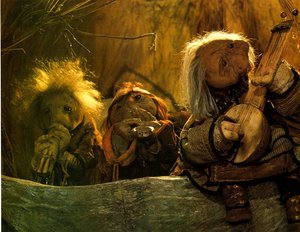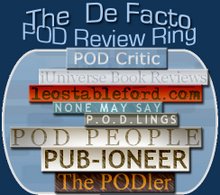
P.O.D.LINGS contacted
Mr. Robinson about sharing a little with us and he was glad to do so. The following is a short interview Jeremy did for us and gives us a bit of insight into the views and experiences of this up and coming novelist.
1.) Having self published your first fiction novel, The Didymus Contingency, in 2005, do you think you've benefited from the experience? If yes, in what way?
Absolutely. Publishing The Didymus Contingency myself was the best thing I’ve ever done for my career. It has sold and is still selling thousands of copies. I signed two foreign translation deals for the book ( Romania and Bulgaria ). I landed a top literary agent. And it provided me with thousands of loyal fans who are gobbling up my second novel, Raising the Past.
2.) I've noticed you're quite diverse, being both a published fiction and non-fiction writer. Which area do you feel most holds your heart and why?
My heart is with fiction. While non-fiction is good for the money aspect, it’s not nearly as satisfying for me personally. The Screenplay Workbook evolved from worksheets my friend and I were making for our personal use...and making a whole book just seemed like the next logical step. That we put it together in a month and sold it the next is a bit amazing. It was my first published book though, and in that way opened up a lot of doors. The second non-fiction book, POD People, was written out of necessity. I receive e-mails almost everyday (three so far today, two yesterday, etc, etc) asking for advice on marketing Print-On-Demand books. I like to respond to all of these e-mails, but it was eating up time that I’d rather spend writing. So I put the book together and now when I receive those e-mails, I just point people to the book.While those projects are great fun, they do little to satiate my desire to tell stories and entertain people through words. Thus, my heart is with fiction.
3.) Having read Raising the Past myself, I can honestly say that it was an excellent sci-fi thriller and had me furiously turning pages. Tell us the one thing that most excites you about the story, perhaps your favorite scene in Raising the Past, and why?
There is a lot I like about Raising the Past. It’s a blend of so many genres I love and its pace was as fun to write as I hope it is to read. But I really enjoy the twist at the end and the way the book tosses around the idea of free will. The novel is based on a screenplay I wrote years before and the screenplay, being limited by 120 pages, lacked the interesting ending and in depth theme. So those elements that make the story something special are what excites me most, because as it was in screenplay format, they didn’t exist.
4.) When you're writing do you find yourself to be an outliner and a disciplined schedule setter or are you more of a "when-the-mood-strikes" kind of a writer?
I'm very disciplined when it comes to sitting down and writing. Once I get into a novel I try to write at the same time everyday for the same amount of hours, usually from 1pm to 5pm. This only changes when I approach the end of the book, then I’ll write in the morning and late into the night as well.As for outlines, I start by laying out key scenes—things I know will be in the book, and then I come up with an ending—where I know I’m going to end up. As for a detailed outline, I create several “where I’ve been and where I’m going” outlines along the way, plotting out all the minor scenes from one key scene to the next. I do this perhaps four times throughout the writing process, mostly as a guide to keep me from forgetting anything important and to help continuity. They aren’t rigid though. I like the story to lead where it may and don’t bind myself to any outlines. This is how the cool new ending in Raising the Past came about. It sort of developed on its own.
5.) What one thing do you believe has most inspired you to be a novelist?
I can’t say I was inspired to be a novelist at all. I have always been inspired to tell stories. It’s been an innate passion of mine my whole life. First I started with art. This stayed true through college where I was an illustration major. I moved on to comic book illustration and ended up writing a few issues. From there I took up screenwriting and then moved on to novel writing. The move to novel writing (at first) was more of an odds choice. There are 300 movies made every year and something like 40,000 screenplays written every year. Those are bad odds, especially in an industry where who you know is more important than how good your story is. With books, the odds are better and I took a stab at it with The Didymus Contingency. I was pretty surprised that after spending so much time on art and screenwriting (not the most literary of writing) that I had a knack for novel writing. The Didymus Contingency was the first prose fiction I’d ever written. It shows (a little) but I’ve tirelessly dedicated myself to improving as a writer. Raising the Past was my second novel and the growth is evident, just as it is between Raising the Past and my recently finished fifth novel, Kronos.
6.) Having written both Christian fiction and secular fiction novels, briefly explain why you have chosen to write in both areas when most authors stick to either religious fiction or non-religious fiction?
I’m a Christian. It’s who I am, so it sneaks into my books, sometimes more blatantly than others. But I’m not a “Christian author” like Jerry Jenkins, Frank Peretti or Ted Dekker. I write mainstream books for a mainstream audience (Christian, non-Christian, etc) and sometimes they have Christian or Biblical themes / plot devices. Sometimes they don’t.
7.) As a consumer, what do you find to be the top three selling points for a fiction novel?
When I go to the book store there are actually three things I do to make a decision about buying a book. It’s pretty simple. 1. The cover. The book has to draw my attention...and then it has to hold it. If the cover gives me enough information about the story and it looks good, I’ll pick the book up and read the back cover. If that's good, then I move on to step two. 2. The author. I always read dedications and acknowledgements. I don’t think many people do this when considering a book, but I always do. They tell me what kind of person the author is. Most authors are nice and very gracious in their acknowledgements, but a few aren’t and I’m less likely to buy a book from an author who seems...unfriendly. 3. I read the first sentence. If it grabs me, I read the first page. If I find myself turning the first page to read the second, I’ll probably buy the book. I was a reader at a literary agency and this sort of became a habit, judging a book by the first few pages, but I’ve never disliked a book I’ve bought, so it seems to work for me.
8.) What is your favorite "fan" comment or experience?
My favorite fan letters have been from non-Christian fans of The Didymus Contingency who recognize the book as being a positive portrayal of Jesus Christ, but who aren’t put off by it. So far I’ve received fan letters from Buddhists, Muslims, Jews, atheists, agnostics and good old “I don’t believe in anything” types. All enjoyed the book regardless of their different beliefs, and that’s really what I wanted the book to be. It’s nice that people can appreciate my Christianity without feeling assaulted by it.
9.) Is there any area of your writing that you hope to improve upon?
I sometimes notice that in my haste to write action I sometimes forget details, things that make the story more tangible. I go back and add where it’s missing, but I’d like to get it on the first time through. Also, something I’ve worked on for a long time is my “cheesiness factor”. This is a hold over from my days writing comic books (and reading comics for years) and involves corny jokes and melodrama. It’s pretty much out of my system now, but I still have to watch out for it.
10.) What can we all look forward to, in the future, from Jeremy Robinson?
There is a lot on the table right now and I don’t have any specifics, but I’m expecting at least one 2007 release, perhaps two. I’m not going to speculate as to which of my novels these will be (though I have an idea). I’ll be writing my sixth novel this winter and spring and my seventh this summer and next winter....I hope. I’m researching both now and will decide which to go forward with in the next week.











